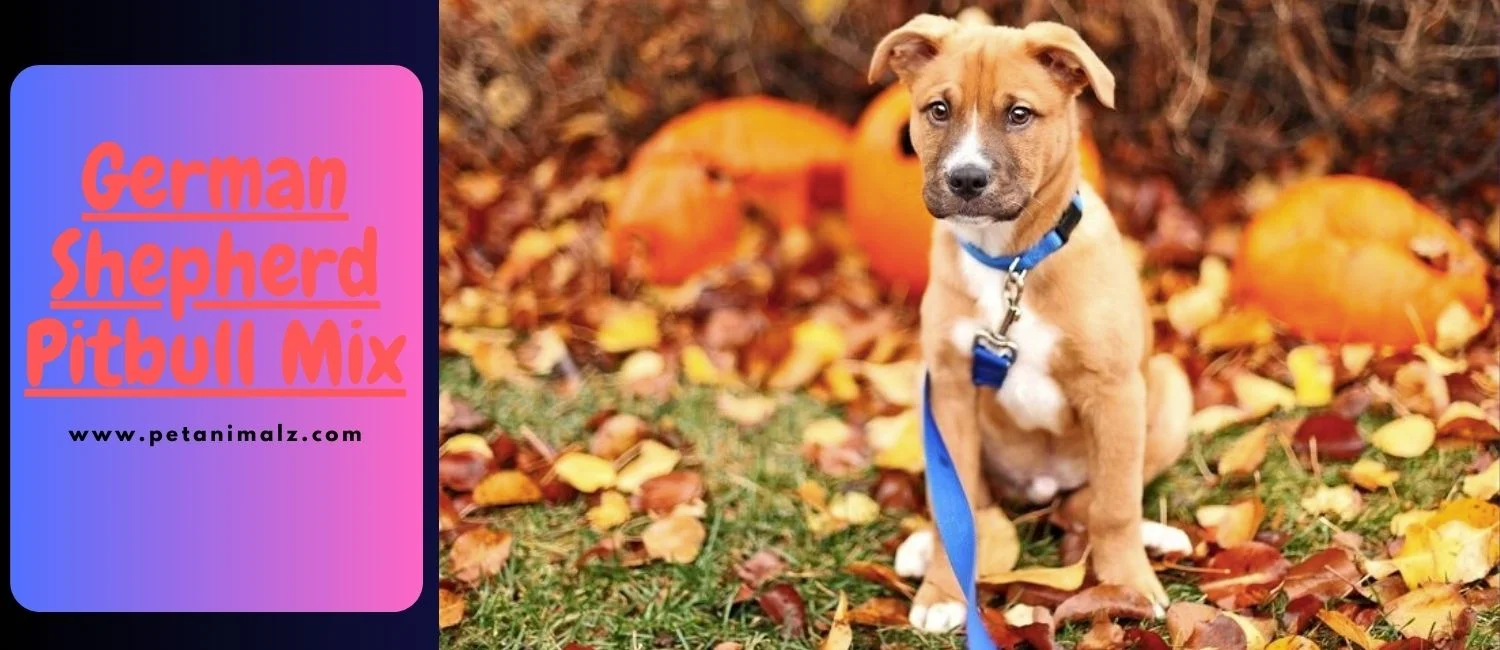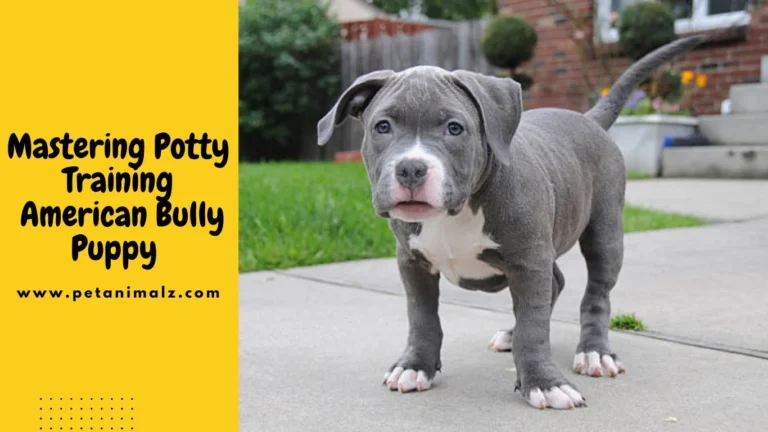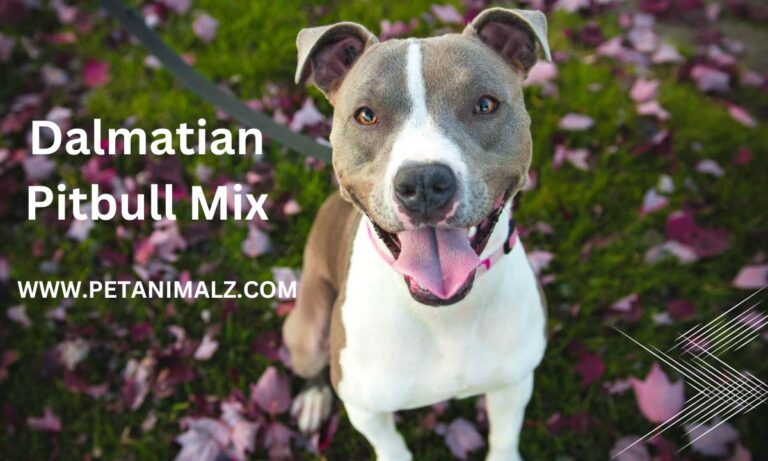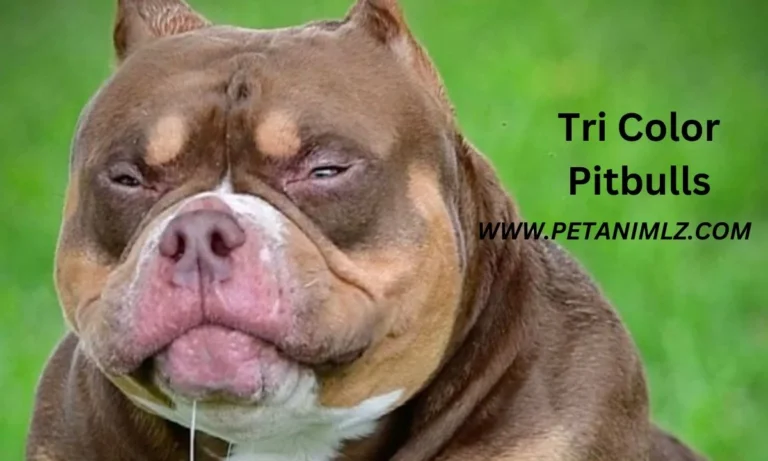German Shepherd Pitbull Mix: A Comprehensive Guide
Introduction to the German Shepherd Pitbull Mix
The German Shepherd Pit-bull Mix, which is also known as a “Sheppit” as well as “German Sheppit,” represents one remarkable hybrid breed that comes into being as a result of interbreeding between the German shepherd and American Pitbull terrier. It combines the characteristics of both purebred dogs hence producing a canine that is very loyal, wise, and full of energy.
In most cases we find the German shepherd being used in the police force, military operations, or for helping handicapped people due to its sense of responsibility, brain power together with protection instincts. Whenever someone talks about the American bull terrier one often thinks about its huge muscles attached to an affectionate character alongside being completely faithful to humans.
A union between these two breeds produces a pet that not only looks powerful but also understands emotions within its owner’s family. The size of Sheppits ranges from medium to large and their bodies are always characterized by muscular build as well as athletic physique. Their fur coat could be either short or long coming in different colors including black, brownish red, or tan among others.
This dog tends to have an assertive nature picked from its parent the German Shepherd while at times showing love associated with pit bulls making them great companions because there will be no intruder who can go unnoticed within yours. When you provide proper training as well as social mingling the German Shepard/Pit-bull Mix may become a caring, defensive, and trustworthy member of your household.
Understanding the Parent Breeds
American Pitbull Terrier
- Origins: Traced back to England and Ireland.
- Characteristics: Medium-sized, muscular build, diverse coat colors.
- Temperament: Friendly, well-tempered, especially good with children.
German Shepherd
- History: Originated from German herding dogs, popularized in the US in the early 1900s.
- Roles: Widely used by military, police forces, and as service animals due to their intelligence and loyalty.
- Personality Traits: Strong, agile, protective, and forms a close bond with the owner.
What does a German Pit look like?
A “German Pit” typically refers to the mix between a German Shepherd and an American Pitbull Terrier. This hybrid can inherit physical traits from both parent breeds, leading to some variability in appearance. However, here are some general characteristics that many German Pits possess:
- Size: They are usually medium to large-sized dogs, with adult weights ranging from 50 to 90 pounds.
- Build: The German Pit often has a muscular and athletic build, combining the strength of the Pitbull with the agility of the German Shepherd.
- Head: Their head can be broad like a Pitbull’s or more tapered like a German Shepherd’s. They may have a pronounced snout, and their ears can be either erect or slightly floppy.
- Eyes: Their eyes are typically almond-shaped and can come in a variety of colors, including brown, hazel, or even blue.
- Coat: The coat can vary in length from short to medium. It’s usually dense and straight.
- Color: German Pits can come in a range of colors, including black, brown, tan, fawn, and sable. They might also have markings or patches in different colors.
- Tail: The tail is usually of medium length and might have a slight curve.
It’s essential to remember that, due to the mixed breed nature of the German Pit, individual appearances can vary widely. Some might look more like a German Shepherd, while others might have more pronounced Pitbull characteristics.
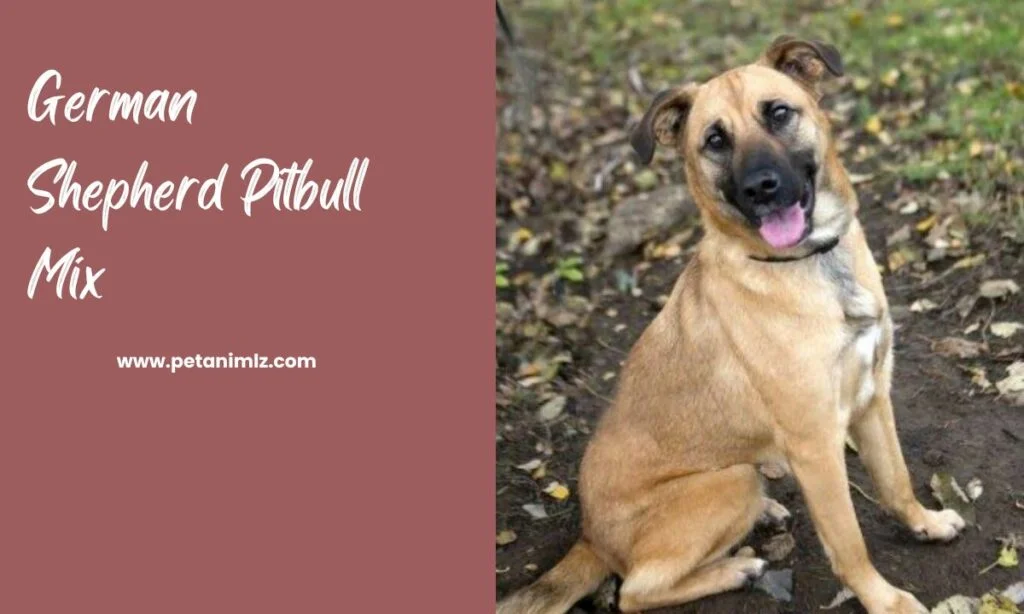
GERMAN SHEPHERD PITBULL MIX: TRAINING AND SOCIALIZATION
To ensure that a German Shepherd Pit-bull Mix remains tame and in equilibrium it should be socialized and trained properly; therefore, one ought to take into consideration the importance of training sessions during puppyhood which would help in setting a firm base. Consistency is vital for quick learning by maintaining straightforward instructions along with using rewarding methods like praises and giving treats to inspire required actions. This breed is quick-witted and hence learns faster but at times shows some form of stubborn attitude thus demanding for aforementioned quality.
To achieve confidence enhancement and decrease probable aggressiveness, the process of socializing must commence with whatever exposure available ranging from both animals as well as humans among others. The German Shepherd Pit-bull Mix is one such breed that can be made adaptable using early socialization and training which will lead to a composed character, resulting in an amiable dog suitable for distinct homes.
In conclusion, while the German Shepherd Pitbull Mix can be a handful, with the right approach to training, they can be loyal, loving, and obedient companions. Remember, every dog is an individual, and understanding their unique personality and needs is crucial to successful training.
Health and Risks of the German Shepherd Pitbull Mix
The German Shepherd Pitbull Mix, also known as the German Pit or Sheppit, is a hybrid breed that can inherit health issues from both its parent breeds. While they are generally healthy and robust dogs, being aware of potential health risks can help in early detection and treatment. Here are some of the common health concerns and risks associated with this mix:
- Hip Dysplasia
- A common issue in many larger breeds, hip dysplasia is a condition where the hip joint doesn’t develop correctly. This can lead to arthritis and pain in severe cases.
- Elbow Dysplasia
- Similar to hip dysplasia but affects the front legs. It can cause lameness and pain.
- Heart Issues
- Both German Shepherds and Pitbulls can be prone to certain heart conditions, including aortic stenosis and mitral valve dysplasia.
- Skin Allergies
- They can develop allergies to certain foods, environmental factors, or fleas, leading to itchy skin, rashes, and frequent ear infections.
- Degenerative Myelopathy
- A condition more common in German Shepherds, it’s a progressive spinal cord disease leading to paralysis.
- Thyroid Issues
- Hypothyroidism can be a concern, leading to issues like obesity, lethargy, and skin problems.
- Eye Problems
- Conditions like progressive retinal atrophy or cataracts can affect this mix.
- Gastric Torsion (Bloat)
- A life-threatening condition where the stomach twists on itself. It’s more common in deep-chested breeds.
- Neurological Disorders
- Conditions like epilepsy can be a concern in some individuals.
- Demodectic Mange
- A skin condition caused by mites. While most dogs have these mites, a weakened immune system can lead to an outbreak.
Preventative Measures:
- Regular Check-ups: Regular vet visits can help in early detection of potential health issues.
- Balanced Diet: Ensure they get a balanced diet to maintain optimal health.
- Exercise: Regular exercise can prevent obesity-related health issues.
- Genetic Testing: If possible, get genetic testing done to be aware of potential inherited health risks.
In conclusion, while the German Shepherd Pitbull Mix can be prone to certain health issues, with proper care, regular check-ups, and a healthy lifestyle, they can lead a long and healthy life. Always consult with a veterinarian regarding any health concerns or changes in behavior.
Life with a German Shepherd Pitbull Mix (GSPM)
Living with a German Shepherd Pitbull Mix (often referred to as a German Pit or Sheppit) can be a rewarding experience, given their unique blend of characteristics inherited from both parent breeds. Here’s what life can be like with a GSPM:
- Active Lifestyle
- GSPMs are high-energy dogs that thrive on activity. Daily walks, play sessions, and mental stimulation are essential to keep them happy.
- Loyal Companionship
- They are known for their loyalty and can form deep bonds with their families. This loyalty often translates into protective behavior, especially around strangers or unfamiliar situations.
- Training and Socialization
- Early training and socialization are crucial. Given their intelligence and sometimes stubborn nature, consistent training methods work best. They respond well to positive reinforcement.
- Space to Play
- While they can adapt to apartment living if given enough exercise, they ideally benefit from a home with a yard where they can play and run.
- Grooming Needs
- Their coat is typically short to medium in length and requires regular brushing to keep it healthy. They are moderate shedders.
- Health Check-ups
- Regular vet visits are essential to monitor for any potential health issues common to the breed, such as hip dysplasia or skin allergies.
- Family Interaction
- With proper socialization, GSPMs can be great with kids and often become protective of younger family members. However, interactions with small children should always be supervised.
- Interaction with Other Pets
- If raised with other pets, they can coexist peacefully. However, their strong prey drive means they might chase smaller animals if not properly socialized.
- Guarding Instincts
- Their natural protective instincts make them excellent watchdogs. They are often wary of strangers but warm up once they sense no threat.
- Long-Term Commitment
- With a lifespan of 10-12 years, adopting a GSPM is a long-term commitment. They thrive on stability and consistent companionship.
- Adaptability
- While they have specific needs, GSPMs are adaptable. Whether you’re an active individual or a family, they can fit well into various lifestyles as long as their basic needs are met.
- Emotional Connection
- GSPMs are known to be emotionally in tune with their owners. They can often sense when you’re feeling down and will be there to offer comfort.
A Quick Guide to the Positives and Negatives of a German Shepherd Pitbull Mix (GSPM)
Positives:
- Loyalty: GSPMs are incredibly loyal to their families, often forming deep bonds with their owners.
- Intelligence: Both parent breeds are known for their intelligence, making the GSPM a quick learner and responsive to training.
- Protective Nature: Their natural guarding instincts make them excellent watchdogs, ensuring the safety of their homes and families.
- Affectionate: Despite their strong appearance, they can be incredibly affectionate and gentle, especially with family members.
- Adaptability: With proper exercise and stimulation, they can adapt to various living conditions, from houses with yards to apartments.
- Health: Being a mixed breed, they can sometimes have fewer health issues than their purebred counterparts due to hybrid vigor.
- Versatility: Their intelligence and energy make them suitable for various activities, from agility courses to hiking companions.
Negatives:
- Training Needs: Their strong-willed nature can sometimes make training a challenge, especially for first-time dog owners.
- Exercise Requirements: They have high energy levels and require regular exercise, which can be demanding for some owners.
- Potential Health Issues: Like all breeds, they can be prone to specific health problems, such as hip dysplasia or skin allergies.
- Size: Being a medium to large dog, they require space and might not be suitable for very small living conditions.
- Socialization: Early and consistent socialization is crucial to prevent aggressive or overly protective behaviors.
- Misunderstood Reputation: Due to the reputation of their parent breeds, especially the Pitbull, they can sometimes be misunderstood or stigmatized.
- Grooming: While not as high-maintenance as some breeds, they do require regular grooming, especially during shedding seasons.
Characteristics of the German Shepherd Pitbull Mix
Appearance
- Physical Features: A blend of the muscular build of the Pitbull and the poised stance of the German Shepherd.
- Coat Types: Ranges from short to medium length, often straight.
- Common Colors: Fawn, brown, black, tan, and occasionally white or grey.
Temperament
- Personality Traits: Loyal, intelligent, and protective. Often showcases a blend of the affectionate nature of the Pitbull and the alertness of the German Shepherd.
- Behavior with Family: Extremely devoted, bonds well with family members, especially children.
- Potential Challenges: Can be assertive; requires consistent training to manage dominant tendencies.
Training Needs
- Importance of Early Training: Essential to start training early to mold behavior.
- Techniques: Positive reinforcement, consistency, and patience.
- Potential Challenges: Stubbornness; might require more advanced training techniques.
Exercise and Living Conditions
- Daily Exercise Needs: Requires about 90 minutes of active exercise daily.
- Ideal Living Conditions: Best suited for homes with spacious backyards.
- Potential Activities: Fetch, agility training, long walks, and playtime with toys.
Health and Nutrition
- Common Health Issues: Hip dysplasia, skin irritations, and certain inherited conditions.
- Lifespan: Averages around 12 years with proper care.
- Dietary Needs: High-quality dog food, rich in protein and essential nutrients.
Grooming
- Coat Care: Regular brushing to keep the coat healthy.
- Bathing Frequency: Once a month or as needed.
- Other Grooming Needs: Regular ear cleaning, nail trimming, and dental care.
Adopting a German Shepherd Pitbull Mix
- Breeders and Puppy Costs:
- Finding reputable breeders is crucial.
- Costs can vary based on lineage and breeder reputation.
- Rescues and Shelters:
- Adopting offers a chance to give a dog a second home.
- Many mixes are waiting in shelters for a loving family.
FAQs
Is a German Shepherd Pitbull mix a good dog?
Yes, a German Shepherd Pitbull mix can be a great dog when properly trained and socialized. They often combine the loyalty and intelligence of the German Shepherd with the affectionate nature of the Pitbull. However, like all breeds, they require consistent training, socialization, and care to ensure they are well-behaved and happy.
What is a Pitbull German Shepherd mix called?
A Pitbull German Shepherd mix is commonly referred to as a “Sheppit” or “German Sheppit.”
Is my German Shepherd Pitbull mix a large breed?
Yes, the German Shepherd Pitbull mix is typically considered a large breed. Adult Sheppits can weigh anywhere from 50 to 90 pounds, depending on their genetics and overall health.
Is a Pitbull a Hybrid Dog?
No, the American Pitbull Terrier is a recognized breed on its own. However, the term “Pitbull” can refer to several breeds, including the American Pitbull Terrier, the American Staffordshire Terrier, and the Staffordshire Bull Terrier. When people refer to “Pitbull mixes” or “Pitbull hybrids,” they are usually referring to a mix between one of these breeds and another breed.
Conclusion
The German Shepherd Pit-bull Mix is a dog breed that represents the intelligence and loyalty of the two parent breeds thereby making them very dynamic and committed companionships. By ensuring early training and socialization, this mix can turn into a well-behaved, adaptive dog. This type of dog requires regular physical activity as well as mental stimulation but they are ideal for family pets due to their friendly nature which comes with an added protective instinct. Proper care will help address possible challenges allowing the German Shepherd Pit-bull Mix to live a completely balanced life as a loving and faithful member of the family.
